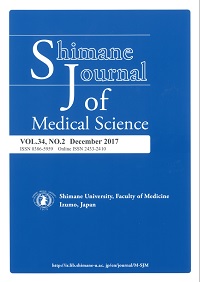Shimane University Faculty of Medicine
ISSN :0386-5959(in print)
ISSN :2433-2410(online)


These article are licensed under a Creative Commons Attribution-NonCommercial-NoDerivatives 4.0 International License.
number of downloads : ?
Use this link to cite this item : https://ir.lib.shimane-u.ac.jp/5845
Shimane Journal of Medical Science 22 1
2005-03-01 発行
Suppressive effect of epigallocatechin-3-gallate, a constituent of green tea, on platelet-derived growth factor-BB signaling pathway in rat A7r5 cells
Terashima, Masaharu
Takahashi, Mai
Yoshimura, Hitoshi
Mitani, Toshifumi
Tanigawa, Yoshinori
File
Description
Epigallocatechin-3-gallate (EGCG), a polyphenol constituent of popular beverage green tea, has been recently attracted much attention for the prevention of atherosclerosis, which is a systemic vessel disease and may lead to a variety of diseases including cardiovascular disease. Platelet-derived growth factor (PDGF) plays an important role as cell-proliferating factor in the pathogenic course of atherosclerosis, and increased activity in the PDGF signaling pathway has been implicated as a contributing factor in the progression. In the present study, to elucidate how EGCG affects the PDGF signaling pathway, we investigated the effect of EGCG on the PDGF-BBinduced activation of Ras-MAPK (mitogen-activated protein kinase) pathway, expression of immediateearly genes, and cell proliferation in rat A7r5 cells. EGCG significantly decreased PDGF-BB-induced ERK1/2 (extracellular signal-regulated kinase 1/2) and MEK1 (MAPK/ERK kinase 1) phosphorylation states dose-dependently, and also inhibited PDGFBB-induced c-fos and c-jun mRNA expressions and cell proliferation. Furthermore, PDGF-BB-induced tyrosine phosphorylation of the cognate receptor was significantly suppressed by EGCG, indicating that EGCG may act at and/or downstream the PDGF β-receptor. These results suggest that EGCG may suppress the cell proliferative signaling pathway through the inhibition of PDGF receptor kinase, MEK/ERK activity and immediate-early gene expressions. Thus, the habitual drinking of green tea may be useful to prevent atherosclerosis, and consequently decrease the mortality of cardiovascular diseases.
About This Article
Other Article
PP. 7 - 11
